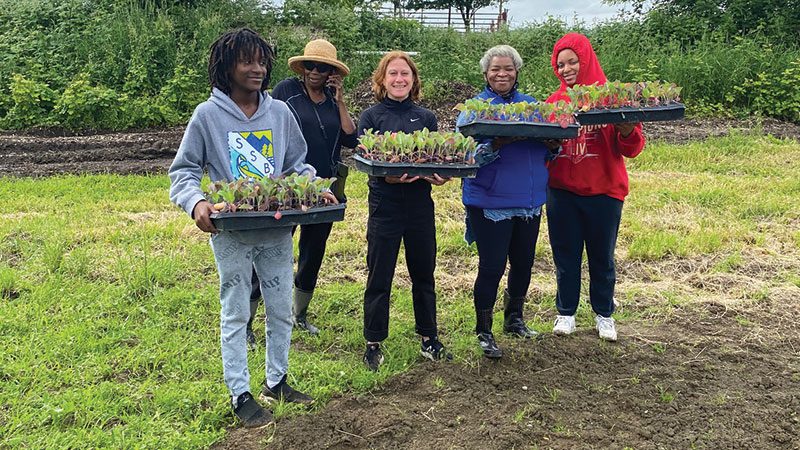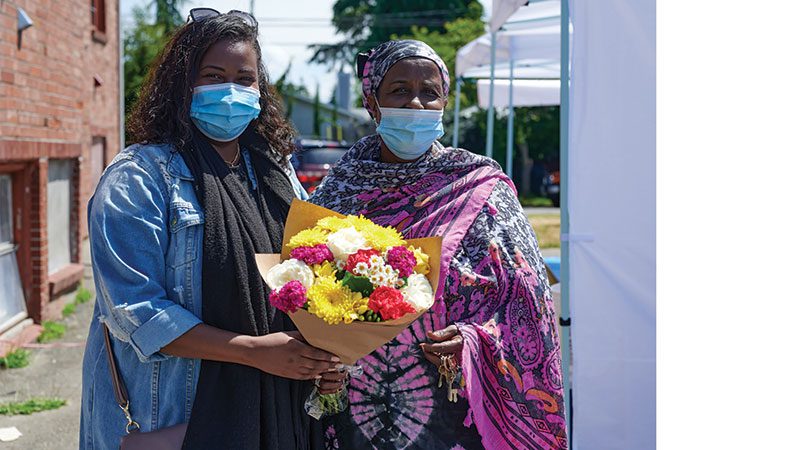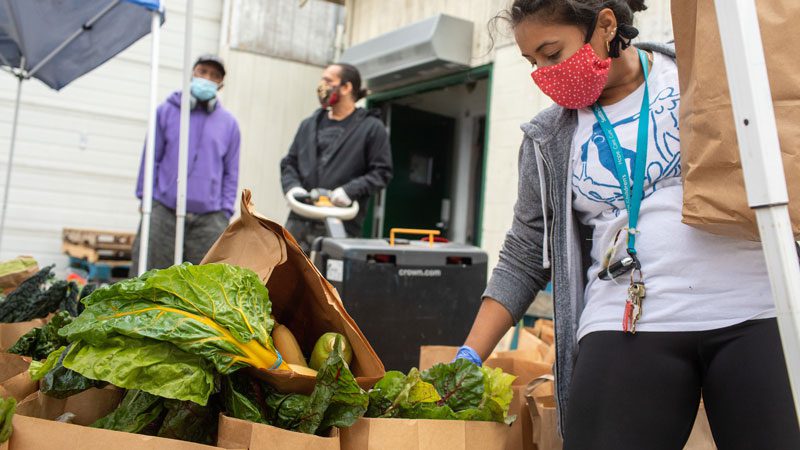PCC grants support creative, essential food programs
This article was originally published in September 2022

We depend on farmworkers for healthful, nutritious foods. But who meets the same needs for those workers and their families?
One remarkable local answer comes from Cooperativa Tierra y Libertad, an agricultural worker cooperative. The 65-acre organic farm on land in Skagit and Whatcom counties, owned and operated by immigrant farmworkers, provides organic, culturally relevant fruits and vegetables to farmworkers, among other programs. It’s one of 11 organizations awarded a PCC Food Access Grant for work that furthers PCC’s mission to ensure that good food nourishes the communities we serve while cultivating vibrant, local, organic food systems.
From schoolchildren to elders, innovative new farmers markets to treasured old community centers, the ten grants in 2022 totaling $67,500 will help nonprofit organizations around the region provide nutritious food to those who need it. The selection committee prioritized organizations run by, for and in historically marginalized communities. The program expands last year’s pilot grants to organizations serving downtown Seattle, which stemmed from feedback PCC received from the community before opening its downtown store. The maximum grant for each organization totals $7,500.
These food access grants are generously funded by members and shoppers through the PCC Food Bank Program, where 100% of donations go toward bringing healthy food to the community.
“PCC is honored to steward this investment in our local food systems, and sharing resources like this is part of our purpose as a co-op,” said Susan Livingston, vice president of marketing and purpose. “Food is simply not optional for any of us…” she said, and the pandemic made it more clear than ever how important it is for us to work together to support our neighbors. “If you can work through food, you can transform communities.”
It’s amazing to see the impact this funding will have, added Rachel Tefft, PCC’s community nutrition program manager. “I hope (members and shoppers) feel excited and proud about the impact of their donations. We’re grateful for every one.”
The 2022 recipients are:
African Community Housing Development

Local asparagus. A dozen eggs. Small-batch strawberry jam. Peanuts.
That’s the sort of fresh, quality groceries available in free “grab-and-go” bags at the Delridge Farmers Market, a community market launched by the African Community Housing Development to address historic food access challenges in the neighborhood.
“(D)esigned by Black youth, the market prioritizes culturally relevant food for immigrant and refugee communities in the neighborhood, which is a United States Department of Agriculture (USDA)-designated “food desert.” The market brings a diverse array of food directly into the neighborhood and makes that food as affordable and accessible as possible,” the grant application said. In an innovative economic development tool, the agency buys all leftover produce at the end of the market at full price, benefiting the Black, Indigenous and People of Color (BIPOC) farmers and vendors who serve the market, then “distributes it directly to community elders and food-insecure families who were unable to access the market due to mobility or transportation barriers” as well as to other local food access organizations.
The program’s scope and frequency continues to increase, and “Abundance is one of the market’s core values—we aim to ensure everyone has as much fresh, high-quality food as they wish,” the application said.
The PCC grant will purchase organic produce from local farms for the prepacked “grab and go” bags.
“We know that stigma and shame around food insecurity is very real, and these free bags ensure that families are able to access healthy, nutrient-dense food without having to speak to anyone or “out” themselves as food insecure,” the application said. The funds will also help buy leftover produce from market farmers to distribute to other community members.
See an earlier Sound Consumer here.
Clean Greens
In 1989 a nonprofit named the Black Dollar Days Task Force (BDDTF) began providing educational opportunities and training in the Seattle area. In 2007, that took the form of the 20-acre Clean Green Farm in Duvall growing organic produce.
It provides affordable “chemical-free” vegetables to the community through a food stand in the Central Area and a CSA program, with the goal of decreasing disparities in health and in food education in the African-American community. A youth program helps students learn hands-on skills, teamwork and leadership. This year Clean Greens also expanded its summer program through a “Clean Greens Rainbow Youth Farm” with weekly work parties.
Primarily run by volunteers, Clean Greens is “on a mission to solve the problem of limited access to healthy foods & produce in low income urban neighborhoods!,” as its website puts it.
The PCC grant will help Clean Greens Farm distribute free vegetables to low-income residents and provide healthy snacks for its youth program and volunteers.
See this earlier Sound Consumer article on the legacy of Clean Greens founder Lottie Cross.
The Common Acre
The Common Acre connects people with the land. Those partnerships take many forms, whether through growing food, distributing food, or supporting pollinators that are essential for plant life.
The PCC grant will help the nonprofit reach its goal to host 50 free community meals per week, and to allow community members to bring home produce, plant starts and garden utensils to help them grow food on their own. Food is grown through the nonprofit’s Alleycat Acres Urban Farm Network, a program operating on four farm sites in Seattle.
“We primarily serve community members living or working near our farm sites. We serve a majority of low-income, BIPOC individuals and families, and we are intentional about offering services that support their participation—such as translation or growing culturally appropriate foods that they are likely to need for traditional recipes…” the organization said in a grant application.
“We are aware that health is a systemic issue for many communities and we are deeply concerned about the increased risks that low-income and BIPOC communities will face due to the pandemic and economic crisis we find ourselves facing. It is more important than ever to provide free-of cost solutions so that everyone can eat something healthy every day.”
Cooperativa Tierra Y Libertad
Founded in 2013, the co-op’s purpose is “to empower farmworker communities to control their own destinies through democratic, participatory and collective ownership over their labor, bodies, sources of income, daily activities and the land where they live and work,” according to its grant application. Operated by immigrant farmworkers who are majority Mixteco and Triqui, its food access work includes providing produce and eggs at low or no cost to Birchwood Food Desert Fighters in Bellingham serving a working class, multi-racial community. It also provides produce to food banks.
The PCC grant will be used to buy and distribute produce from Tierra y Libertad to farmworker communities in Skagit and Whatcom counties, working with its sister organizations, Community to Community Development (C2C) Promotoras, and farmworker union Familias Unidas por la Justicia (FUJ) to distribute blueberries, nopales and chilacayotes (squash).
As the co-op noted in its application, as many as 65% of farmworkers around the U.S. experience food insecurity.
“At the same time, farmworkers are an integral part of the food system; without farmworkers, food doesn’t get planted, cared for, grown, picked or packed for distribution. It is cruelly ironic that those who provide the labor that makes food production possible in the United States are exploited to such an extent that over half are denied access to the same food they produce.”
Resources meant to address food insecurity are often not available to farmworkers or are intimidating for them to access, issues that the co-op and its partners are well equipped to address. And the grant will provide welcome support for the fledgling co-op, which lost its entire raspberry crop in the record heat wave of 2021 and then faced floods and other weather-related setbacks.
Cultivate South Park
At El Mercadito, the first farmers market in the South Park neighborhood, residents of all income levels mingle and enjoy fresh produce and a sense of community. Families facing food insecurity typically receive food for free, while those with higher incomes pay market rates. The hybrid approach, wrote organizing agency Cultivate South Park in its grant application, “neutralizes the shame some families experience when visiting a food bank” while creating a relevant, accessible public space to people from different income levels and walks of life. The market, with its food, arts and opportunities, creates a sense of belonging that food banks cannot, organizers wrote, and increases access to economic opportunity as well as fresh food.
Cultivate South Park guarantees weekly sales for BIPOC farmers at the El Mercadito market, providing free food to market visitors in need: “Our farmers benefit and our customers benefit.” Additionally, the organization stocks a food pantry, Casa Orilla, during the market’s off season, including culturally relevant staples that are often hard to find in traditional food banks.
The PCC grant will go to purchase fresh produce directly from farm vendors at El Mercadito for distribution at the free booth or supplies for Casa Orilla. It will also support other Black, Indigenous and other farmers of color who don’t sell at the market through direct purchases of produce that will be packed in boxes and delivered to neighborhood homes in need, in a community with a large percentage of low-income and ethnically diverse residents.
The Southwest Seattle community is “rich with cultural identity and strong connections to food and agriculture spanning the globe…(yet) disproportionately lacks access to healthy food, clean air, clean water, and financial resources when compared to other areas of Seattle,” the application said.
Asked how the project will impact the communities the organization serves, Cultivate South Park’s organizers replied, in part, “Cultivate South Park is composed solely of community members. The main way that we partner with our community is that we are a part of the community.”
See this earlier Sound Consumer article on the market.
FareStart
For 30 years, FareStart has provided community meals, job training programs and other services to people who are “furthest from opportunity and most affected by poverty, homelessness and hunger.”
The nonprofit’s PCC grant will be used to buy organic foods for a pilot Community Market program. The mobile market began in 2021, distributing free, fresh produce and other foods in subsidized housing communities and other locations that would reach people who are food insecure and historically marginalized.
At the markets, families can choose their own groceries, averaging 10 to 17 pounds per household. FareStart plans to host 87 mobile market events by the end of 2022.
FareStart is working to buy produce for the program through local farms, with a particular focus on BIPOC producers.
Plant-Based Food Share
From soil to table, this program helps make organic, plant-based foods more accessible to underserved communities. The nonprofit’s Free Food Box program distributes 200 to 300 boxes weekly of “produce, pantry essentials, dairy-free milk, pots, soil, edible plant starts, seeds and some prepared foods from various cuisines and cultures, along with recipes and cooking tips, and virtual cooking classes,” according to the grant application.
Boxes are distributed to south and central Seattle and South King County with a focus on underserved BIPOC recipients, as well as those with vulnerable medical conditions. The contents are sourced from BIPOC farmers and chefs as well, and the organization partners “with local BIPOC nutritionists, nutrition professors, doulas and herbalists to support our work within the community and with the families we serve, to make sure food boxes can meet the nutritional and dietary needs of our recipients.”
A complementary “Garden Share” program helps box recipients garden, and connects those without access to land with volunteers willing to host garden space and classes.
“Structural racism, environmental injustice and other factors have contributed to the present moment in which low income and people of color in urban areas have extremely limited access to open space, specifically where they are able to plant and grow their own food,” the application said.
“We will help our community build their relationship to nature in one of the most powerful ways possible, the reciprocal activity of gardening and producing food.”
The food boxes are assembled by and distributed to community members in south and central Seattle and South King County. Plant-Based Food Share will use the PCC grant to continue and expand the box program, helping “build the community that will advance food, environmental and racial justice.”
Rainier Valley Food Bank

The Rainier Valley Food Bank is Seattle’s busiest food bank, serving an estimated 25% of all individuals seeking food assistance in the city. Unlike many other food banks, it is open to all, not restricted to clients who live in a particular geographic area.
The food bank’s programs offer “a justice-based approach to food distribution,” the application said, buying fresh foods, purchasing from local farmers to support the community and reduce their carbon footprint, and participating in grocery rescue and gleaning programs to redistribute food that would otherwise be wasted.
The PCC grant will help provide fresh, culturally relevant foods in an “ever-growing and diverse” community. “Seattle is one of the most expensive cities to live in in the nation, and the obstacles to affordability are only exacerbated in the Rainier Valley—home to many people of color, immigrants, and refugees who regularly face systemic obstacles to living wage employment, affordable housing and food security,” the application said. Nearly 75% of clients are people of color and first-generation immigrants, the application noted. The poverty rate in the food bank’s main service area has a far higher percentage than the city average of people living in poverty and who are food insecure.
The food bank seeks to provide more culturally significant foods “not only to those who have made specific requests, but to those in our community that can benefit from foods that they are familiar with,” the application said.
“Being able to provide culturally relevant foods during periods like Chinese New Year, Hanukkah, Christmas, or even just an average Thursday helps us to support our community at a deeper level than just by feeding them. Many people in our community require specialized diets for cultural and/or medical reasons, and every person deserves access to foods that are important to them culturally.”
See this earlier Sound Consumer article featuring the food bank.
Sno-Valley Senior Center

A community dining center serving this rural Eastside region provides hot, nutritious, made-from-scratch meals to older adults every weekday. More than an affordable meal (it’s donation-based, with no one turned away), it’s also a chance to socialize and stay active and engaged, a particular benefit for those who live alone.
“I love our lunch. I’m not depressed anymore with the great company,” was one participant’s feedback.
The Carnation center is reaching out to encourage more Hispanic senior citizens in the majority-white region to benefit from the program. It’s partnered with SeaMar, a community health center, for culturally relevant outreach, including an interpreter and help finding Spanish-speaking volunteers and advocates for the elders’ needs. “Already, we have seen a jump in participation of Spanish speaking elders from six to 22 people thanks to the outreach done this year,” the grant application said. The center is also reaching out to LGBTQ elders and those of Indian descent.
The PCC grant will be used to buy organic produce from Snoqualmie Valley farmers for the lunches, helping both stabilize the farms with guaranteed orders but also get “quality, fresh organic produce” to senior citizens who might not otherwise have access to it.
“In general, the Snoqualmie Valley has low access to fresh, organic produce although we are surrounded by farms that sell at Pike Place Market and local restaurants,” the application said. “The price is a challenge for some as well as lack of access to purchase nearby. This grant would increase the opportunity for fresh food for all older adults especially those of marginalized populations.”
Solid Ground
At Lowell Elementary School, a recently opened food pantry will help students focus on learning, playing and healthy development. Nonprofit agency Solid Ground, whose motto is that it believes “poverty is solvable,” will use a PCC grant to buy organic food for the pantry, which serves a disproportionate number of students facing food insecurity.
As of September 2021, 72 students (roughly a quarter of the school’s enrollment) qualified for the federal McKinney-Vento program assisting families that did not have permanent housing. More than half the students qualify for free or reduced-price lunches.
The school and its “amazing staff members” are working in several ways to help nourish students, including a school garden and a nutrition education program that Solid Ground also supports.
“We continue to look for ways to help Lowell find sustained funding for their food pantry, knowing that the food insecurity many of their students experience is not a one-time event,” the organization wrote in its grant application. But the PCC grant will help build a solid footing, letting students establish “the foundations for long-term stability, health, and well-being.”
South Seattle College Food Pantry
In 2017 student leaders at South Seattle College established a campus food pantry to support an increasing number of students experiencing homelessness—operated by students and for students. Hunger is a significant issue on many college campuses: Even before the COVID-19 pandemic, just over half of South Seattle College respondents in a student survey reported being food insecure in the past 30 days.
“Many of our students have to choose between paying college expenses and putting food on the table. Not having reliable access to sufficient, nutritious and culturally relevant food makes it stressful to study and challenging to be academically successful. Many of our students are the first in their family to attend college and have been deeply impacted by the pandemic,” the college wrote in a grant application.
(The pantry shifted to online orders and other forms of assistance during the pandemic; it expects to re-open the physical pantry this year.)
With ever-rising needs and costs colliding with college budget cuts, though, the pantry was only funded for “minimum” staples this year in the form of packaged foods.
The PCC grant will allow the pantry to add fresh and organic foods to their options.
Nearly two-thirds of the students work, and more than a fifth have children or other dependents, so having the pantry on campus gives them one less errand and burden, helping “keep them in school and on track to graduate,” the application said.
“Fall quarter is always a busy, exciting period for us with new students and new dreams,” the application said. The pantry allows more of them to focus on those dreams, with student feedback that the service is “a life saver” and “there are times when I would have been so hungry without it.”
